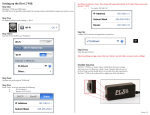Download GV500 User Manual
Transcript
GV500 User Manual GSM/GPRS/GPS Tracker User Manual TRACGV500UM001 Revision: 1.00 GV500 GV500 User Manual Document Title GV500 User manual Version 1.00 Date 2013-08-20 Status Release Document Control ID TRACGV500UM001 k n i l l c a i e t u n Q fide n o C General Notes Queclink offers this information as a service to its customers, to support application and engineering efforts that use the products designed by Queclink. The information provided is based upon requirements specifically provided to Queclink by the customers. Queclink has not undertaken any independent search for additional relevant information, including any information that may be in the customer’s possession. Furthermore, system validation of this product designed by Queclink within a larger electronic system remains the responsibility of the customer or the customer’s system integrator. All specifications supplied herein are subject to change. Copyright This document contains proprietary technical information which is the property of Queclink Limited., copying of this document and giving it to others and the using or communication of the contents thereof, are forbidden without express authority. Offenders are liable to the payment of damages. All rights reserved in the event of grant of a patent or the registration of a utility model or design. All specification supplied herein are subject to change without notice at any time. Copyright © Shanghai Queclink Wireless Solutions Co., Ltd. 2013 TRACGV500UM001 -1- GV500 User Manual Contents Contents ............................................................................................................................................ 2 Table Index........................................................................................................................................ 3 Figure Index ...................................................................................................................................... 4 0. Revision history ............................................................................................................................ 5 1. Introduction ................................................................................................................................... 6 1.1. Reference............................................................................................................................. 6 1.2. Terms and Abbreviations .................................................................................................... 6 2. Product Overview ......................................................................................................................... 7 2.1. Description .......................................................................................................................... 7 2.2. Parts List.............................................................................................................................. 7 2.3. Interface Definition ............................................................................................................. 8 3. Getting Started .............................................................................................................................. 9 3.1. Opening the Case ................................................................................................................ 9 3.2. Closing the Case ................................................................................................................ 11 3.3. Installing a SIM Card ........................................................................................................ 12 3.4. Installing the Internal Backup Battery............................................................................... 13 3.5. Device Status LED ............................................................................................................ 13 4. OBD II-related features ............................................................................................................... 15 4.1. Communication Protocols ................................................................................................. 15 4.2. OBD II Parameters ............................................................................................................ 15 k n i l l c a i e t u n Q fide n o C TRACGV500UM001 -2- GV500 User Manual Table Index TABLE 1: GV500 PROTOCOL REFERENCE ....................................................................................... 6 TABLE 2: TERMS AND ABBREVIATIONS ......................................................................................... 6 TABLE 3: PART LIST ............................................................................................................................. 7 TABLE 4: DESCRIPTION OF OBD II CONNECTIONS ...................................................................... 8 TABLE 5: DEFINITION OF DEVICE STATUS AND LED ................................................................. 14 k n i l l c a i e t u n Q fide n o C TABLE 6: COMMUNICATION PROTOCOLS LIST ........................................................................... 15 TRACGV500UM001 -3- GV500 User Manual Figure Index FIGURE 1: APPEARANCE OF GV500 .................................................................................................. 7 FIGURE 2: THE OBD II CONNECTOR ON THE GV500..................................................................... 8 FIGURE 3: OPENING THE CASE ....................................................................................................... 10 FIGURE 4: CLOSING THE CASE ....................................................................................................... 12 FIGURE 5: SIM CARD INSTALLATION ............................................................................................ 12 k n i l l c a i e t u n Q fide n o C FIGURE 6: BACKUP BATTERY INSTALLATION ............................................................................. 13 FIGURE 7: GV500 LED ON THE CASE.............................................................................................. 13 TRACGV500UM001 -4- GV500 User Manual 0. Revision history Revision Date Author Description of change 1.00 2011-8-16 Leo LEI Initial k n i l l c a i e t u n Q fide n o C TRACGV500UM001 -5- GV500 User Manual 1. Introduction The GV500 is a powerful GPS locator designed for vehicle or asset tracking. It has superior receiver sensitivity, fast TTFF (Time to First Fix) and supports Quad-Band GSM frequencies 850/900/1800/1900, its location can be monitored in real time or be periodically tracked by a backend server or other specified terminals. The GV500 has multiple input/output interfaces that can be used for monitoring or controlling external devices. Based on the integrated @Track protocol, the GV500 can communicate with a backend server through the GPRS/GSM network to transfer reports of Emergency, geo-fence boundary crossings, low backup battery or scheduled GPS position as well as many other useful functions. Users can also use GV500 to monitor the status of a vehicle and control the vehicle by its external relay output. System Integrators can easily setup their tracking systems based on the full-featured @Track protocol. k n i l l c a i e t u n Q fide n o C 1.1. Reference Table 1: GV500 Protocol Reference SN Document name Remark [1] GV500 @Track Air Interface Protocol The air protocol interface between GV500 and backend server. 1.2. Terms and Abbreviations Table 2: Terms and Abbreviations Abbreviation Description PWR External Power Supply GND OBD SAE Ground On-Board Diagnostics Society of Automotive Engineers TRACGV500UM001 -6- GV500 User Manual 2. Product Overview 2.1. Description GV500 is based on the OBD II interface GPS vehicle tracking device, compact design and easy to install. GV500 contains an OBD II connector which complies with J1962 standard, a 10PIN USB connector, an internal GSM antenna, an internal GPS antenna and three LEDs. k n i l l c a i e t u n Q fide n o C Figure 1. Appearance of GV500 2.2. Parts List Table 3: Part List Name GV500 Locator Picture 48mm*25mm*48mm DATA_CABLE_M (Optional) TRACGV500UM001 -7- GV500 User Manual 2.3. Interface Definition The GV500 has an OBD II connector. It contains power supply and interfaces of CAN bus, K-line, L-line and J1850 bus. The sequence and definition of the OBD II connector are shown in following figure: k n i l l c a i e t u n Q fide n o C Figure 2. The OBD II connector on the GV500 Table 4: Description of OBD II Connections Index 1 2 3 4 5 6 7 8 9 Description Comment PWR External DC power input, 8-32V L-line L line of ISO 9141-2 and ISO 14230-4 CAN-L CAN-L line of ISO 15765-4 J1850- Bus negative line of SAE J1850 K-line K line of ISO 9141-2 and ISO 14230-4 CAN-H CAN-H line of ISO 15765-4 GND Power and digital ground GND Power and digital ground J1850+ Bus positive line of SAE J1850 TRACGV500UM001 -8- GV500 User Manual 3. Getting Started 3.1. Opening the Case Insert the triangular-pry-opener into the gap of the case as shown below, push the opener up until the case unsnapped. k n i l l c a i e t u n Q fide n o C TRACGV500UM001 -9- GV500 User Manual k n i l l c a i e t u n Q fide n o C Figure 3. TRACGV500UM001 Opening the Case - 10 - GV500 User Manual 3.2. Closing the Case The battery is glued to top cover, so before closing the case you should let the battery connector plugged in. The step of closing case is shown as following: k n i l l c a i e t u n Q fide n o C TRACGV500UM001 - 11 - GV500 User Manual k n i l l c a i e t u n Q fide n o C Figure 4. Closing the Case 3.3. Installing a SIM Card Open the case and ensure the unit is not powered. Slide the holder right to open the SIM card. Insert the SIM card into the holder as shown below with the gold-colored contact area facing down taking care to align the cut mark. Close the SIM card holder. Close the case. Figure 5. TRACGV500UM001 SIM Card Installation - 12 - GV500 User Manual 3.4. Installing the Internal Backup Battery k n i l l c a i e t u n Q fide n o C Figure 6. Backup Battery Installation There is an internal backup Li-ion battery. 3.5. Device Status LED Figure 7. TRACGV500UM001 GV500 LED on the Case - 13 - GV500 User Manual LED CEL (note1) GPS (note 2) Table 5: Definition of Device status and LED Device status LED status Device is searching GSM network Fast flashing (Note3) Device has registered to GSM network. Slow flashing (Note4) SIM card needs pin code to unlock. ON GPS chip is powered off OFF GPS sends no data or data format error. Slow flashing GPS chip is searching GPS info. Fast flashing GPS chip has gotten GPS info. ON No external power and internal battery voltage is lower than 3.35V. OFF No external power and internal battery voltage is below 3.5V. Slow flashing External power in and internal battery is charging Fast flashing External power in and internal battery is fully charged ON k n i l l c a i e t u n Q fide n o C OBD (note 2) Note: 1 - CEL LED cannot be configured. 2 - GPS LED and OBD LED can be configured to turn off after a period of time using the configuration tool 3 - Fast flashing is about 60ms ON/ 780ms OFF 4 - Slow flashing is about 60ms ON/ 1940ms OFF TRACGV500UM001 - 14 - GV500 User Manual 4. OBD II-related features 4.1. Communication Protocols GV500 could monitor the OBD II system via not only communication protocols which defined by SAE but also some special protocols. The list of protocols is shown as follow: k n i l l c a i e t u n Q fide n o C Table 6: Communication Protocols List No. 1 2 3 4 5 6 7 8 9 10 11 12 13 Protocol Comment J1850 PWM 41.6kb/s FORD J1850 VPW 10.4kb/s GM/Chrysler ISO 9141-2 5 Baud init automatic baud rate ISO 14230 5 Baud init 10.4kb/s ISO 14230 Fast init 10.4kb/s ISO 15765 ID 11bits 500kb ISO 15765 ID 29bits 500kb ISO 15765 ID 11bits 250kb ISO 15765 ID 29bits 250kb J1939 ID 29bit 250kb CAN_USER1 11*bits 125*kb CAN_USER2 11*bits 50*kb VW TP2.0 Volkswagen CAN protocol 4.2. OBD II Parameters The following are parameters which are read through OBD II system by GV500: 1) Vehicle identification number(VIN): 2) Revolutions per minute of the engine(RPM) 3) Vehicle road speed 4) Battery voltage of vehicle 5) Malfunction Indicator Lamp(MIL) 6) Fuel consumption 7) Diagnostic Trouble Codes(DTC) 8) Distance Statistics 9) Engine coolant temperature 10) Parameter identification(PID) Note: 1 - The VIN is the unique identifier of Vehicle. Please note that not all Vehicle support getting the VIN from OBD II system, because the Vehicle manufacturers are responsible for defining the data TRACGV500UM001 - 15 - GV500 User Manual return from OBD II system. 2 - Distance Statistics: GV500 could get the distance in two case: distance accumulated since MIL is activated and distance accumulated since DTCs were cleared. k n i l l c a i e t u n Q fide n o C TRACGV500UM001 - 16 -






































